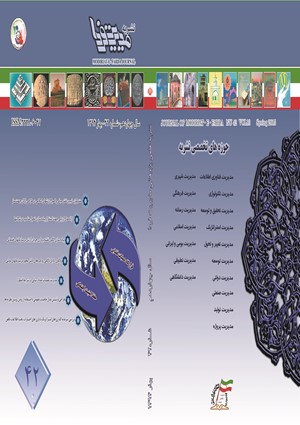ارائه الگوي مفهومي مديريت دانش مبتني بر سرمايه فکري و دانش مديريت پروژه در سازمان هاي پروژه محور (مطالعه موردي در صنعت پتروشيمي)
محورهای موضوعی :فرناز برزین پور 1 , عبدالکريم سباعي 2
1 - دانشگاه علم و صنعت ایران
2 -
کلید واژه: مديريت دانش الگوي مفهومي مديريت پروژه نقشه راه,
چکیده مقاله :
عدم اجراي مديريت دانش در پروژه ها، منجر به پراکندگي دانش و از بين رفتن يادگيري سازماني مي شود. در اين مقاله، با توجه به اهميت مديريت دانش در سازمان هاي پروژه محور، يک الگوي مديريت دانش مبتني بر شش سطح سلسله مراتبي ارائه شده است که بيانگر مقاطع زماني انجام مديريت دانش و نيز گستردگي دانش مورد نظر جهت کشف، کسب و تسهيم دانش است. سطح صفر، معادل بازنگري هاي پسا پروژه اي است. از آنجا که با گذشت زمان، ارزش بالقوهي استفادهي مجدد از دانش يک رويداد در پروژه تقليل مييابد، در سطح دوم الگو، دانش فرايندهاي برنامه ريزي و فرايندهاي پياده سازي(اجرا، کنترل و نظارت) پروژه در طول هر فاز پروژه مديريت مي شود و اين امر بيانگر ارزش زماني دانش است. با توجه تأکيد الگو بر دانش مديريت پروژه، سطح سوم در برگيرنده ده حوزه دانشي مديريت پروژه است. سطح چهار، بيانگر ارتباط ابعاد الگوي مديريت دانش و سرمايه فکري سازمان است. جايگاه نفشه هاي دانش در سطح پنجم الگو نمود پيدا کرده است. در ادامه يک نقشه راه پياده سازي مشتمل بر ده گام ارائه شده است. از انجا که نقشه راه پيشنهادي ريشه در مفاهيم و ويژگي هاي الگوي پيشنهادي مديريت دانش دارد، مي تواند پياده سازي آن را در سازمان هاي پروژه محور تسهيل نموده و مديريت به هنگام دانش، کاهش هزينههاي پروژه و تسهيل يادگيري سازماني را به همراه داشته باشد. پژوهش در يک سازمان پروژه محور خصوصي انجام يافته است که گستره بزرگي از خدمات مهندسي، تامين و تدارکات کالا، ساختمان و نصب و راه اندازي را در پروژه هاي پتروشيمي، نفت و گاز ارائه مي دهد.
The Lack of project knowledge management in projects results in organizational knowledge fragmentation and loss of organizational learning. Due to importance of knowledge management in project based organizations, a knowledge management model with six hierarchical-levels is presented in this article indicating the time line for knowledge management and the extent of knowledge to be captured, acquired and shared. Level zero is equivalent to post-project reviews. Since the potential value of reuse of incident knowledge is declining over time, it is proposed in the second level to manage planning and implementation (execution, control and monitor) knowledge during each project phase respectively, conveying the concept of time value of the knowledge. The third level encompasses ten knowledge management areas in project management. The fourth level shows that the relationship between KM model dimensions and organizational intellectual capital. Knowledge maps role is apparent in fifth level. Finally, an implementation roadmap, including ten steps is presented. Since the proposed roadmap has its root in concepts and features of the proposed KM model, it could facilitate implementation of the KM model in project based organizations and lead to in-time knowledge management, project cost reduction and flourishing organizational learning. The research conducted in a project based organization in private sector, playing an active role in a wide range of services; engineering, procurement, installation, construction and commissioning in oil, gas and petrochemical projects.


